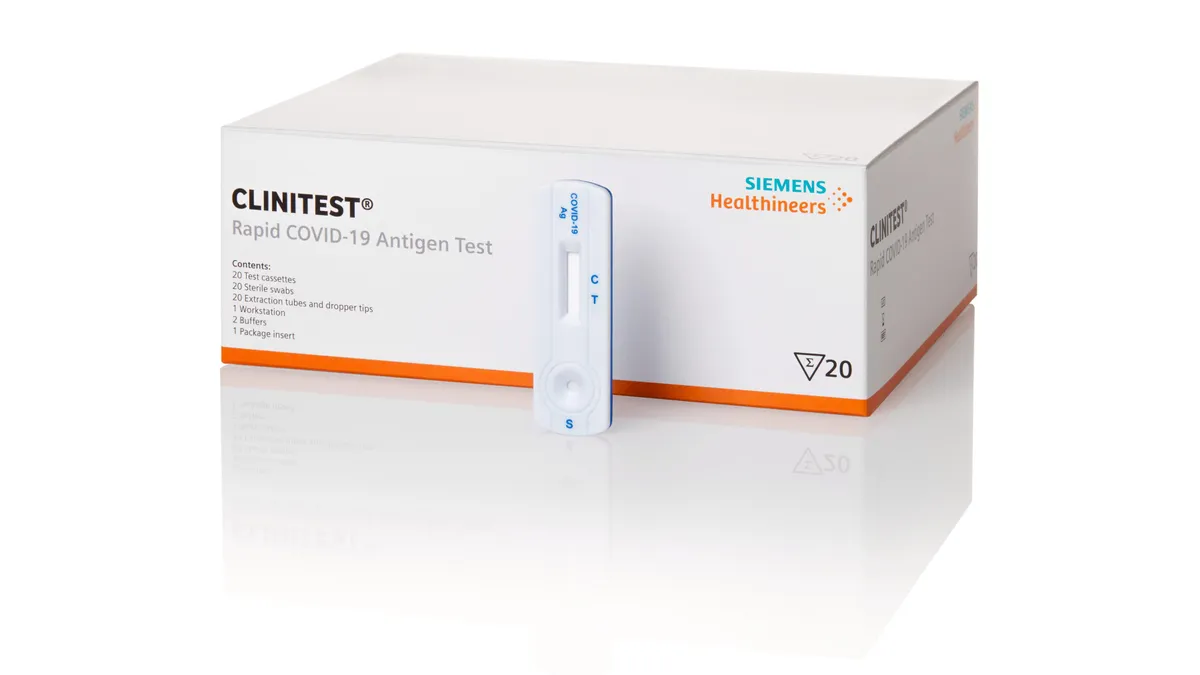Dive Brief:
-
Diagnostic revenues at Siemens Healthineers doubled in the third quarter as COVID-19 rapid antigen test sales surged and routine testing normalized.
-
Siemens generated €600 million ($713 million) from COVID-19 rapid antigen tests, up more than 200% on the prior quarter, as demand surged in Europe, though sales are expected to "decline significantly" over the final three months of the fiscal year.
- Despite forecasting falling COVID-19 test sales, Siemens raised its full-year growth target to 17% to 19%. Siemens went into the year expecting to grow revenues by 5% to 8%.
Dive Insight:
Siemens has repeatedly outperformed expectations in 2021, enabling it to ratchet up its sales growth forecast to well above its initial target. The quarter was enabled by soaring sales of COVID-19 rapid antigen tests.
Unlike companies such as Abbott and Quidel, which have posted fast-falling sales of COVID-19 rapid antigen tests, Siemens primarily serves the European market. Demand appears to have peaked later in Europe than in the U.S., leading Siemens to report a bumper quarter at a time when other rapid antigen test makers are downgrading expectations.
Siemens expects April to June to be the peak period for its COVID-19 business, with sales forecast to fall sharply over the following few months. Siemens Healthineers is looking to less-vaccinated regions such as Southeast Asia and Australia for continued demand for COVID-19 antigen tests, CEO Bernd Montag said, but even there "the demand is much, much lower."
Even with the anticipated decline, Siemens forecasts sales rapid COVID-19 antigen tests of €1 billion for the full year, up from €750 million in its prior guidance. The bump in COVID-19 sales, coupled to the continued normalization of routine testing volumes, led Siemens to raise the full-year growth target for its diagnostics business from 25% to 35%.
Diagnostic growth in the second quarter powered total revenues to €5 billion, beating the €4.5 billion consensus estimate of analysts. The performance was supported by double-digit growth in imaging and advanced therapies, both of which were negatively affected in the comparable period of 2020 by the pandemic. Siemens expects imaging growth to continue even as the pandemic boost fades.
"The special CT pandemic demand is not something we see continuing, but still very, very strong growth in CT, simply because of the ease of installation and so on," Montag said. MR is yet to hit the level of growth of CT, but Montag framed that as positive news as it "means that there is still some pent-up demand."
Siemens closed its takeover of Varian early in the third quarter. Analysts asked Siemens about the impact of draft plans in the U.S. that point "to some fairly material reductions in reimbursement" for radiation oncology treatments. The planned cuts have alarmed the body that represents healthcare professionals working in the space.
Montag is more sanguine about the changes, telling investors that the downsides are offset by the fact the policy encourages upgrades to more modern hyperfractionated treatment schemes. Varian is also somewhat insulated from any pressures in the U.S. as equipment sales in the country make up less than 20% of sales.











